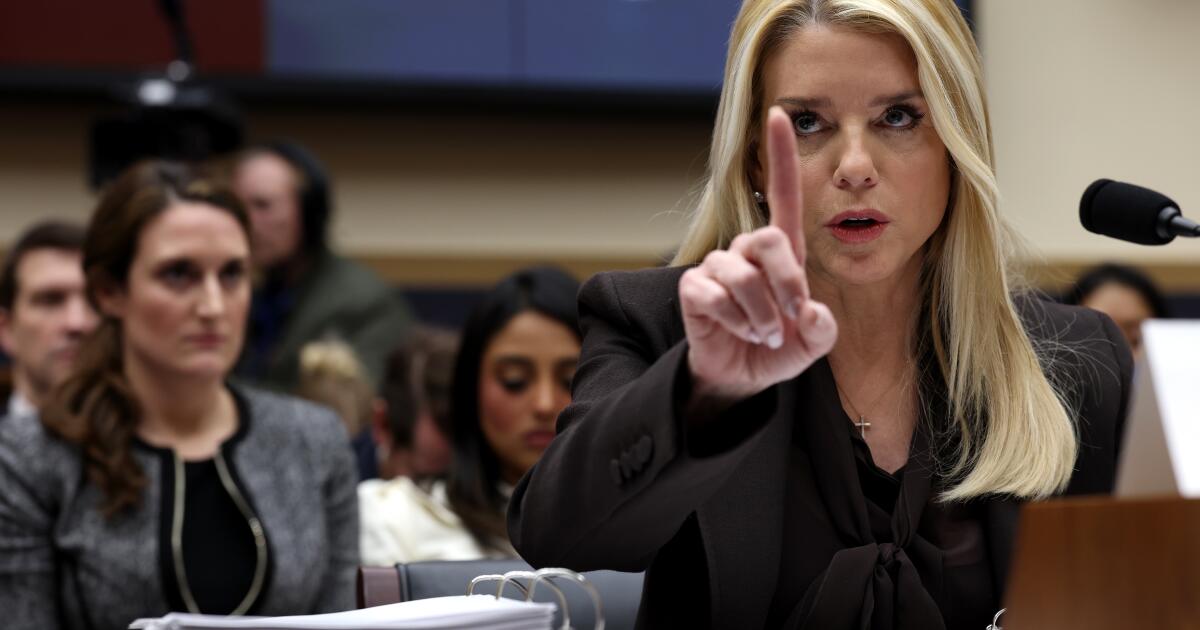Bondi clashes with Democrats over Epstein, political retribution claims
WASHINGTON — U.S. Atty. Gen. Pam Bondi repeatedly sparred with lawmakers on Wednesday as she was pressed over the Justice Department’s handling of the Jeffrey Epstein investigation and faced demands for greater transparency in the high-profile case.
Bondi accused Democrats and at least one Republican on the House Judiciary Committee of engaging in “theatrics” as she fielded questions about redaction errors made by the Justice Department when it released millions of files related to the Epstein case last month.
The attorney general at one point acknowledged that mistakes had been made as the Justice Department tried to comply with a federal law that required it to review, redact and publicize millions of files within a 30-day period. Given the tremendous task at hand, she said the “error rate was very low” and that fixes were made when issues were encountered.
Her testimony on the Epstein files, however, was mostly punctuated by dramatic clashes with lawmakers — exchanges that occurred as eight Epstein survivors attended the hearing.
In one instance, Bondi refused to apologize to Epstein victims in the room, saying she would not “get into the gutter” with partisan requests from Democrats.
In another exchange, Bondi declined to say how many perpetrators tied to the Epstein case are being investigated by the Justice Department. And at one point, Rep. Thomas Massie (R-Ky.) said the Trump administration was engaging in a “cover-up,” prompting Bondi to tell him that he was suffering from “Trump derangement syndrome.”
The episodes underscore the extent to which the Epstein saga has roiled members of Congress. It has long been a political cudgel for Democrats, but after millions of files were released last month, offering the most detail yet of Epstein’s crimes, Republicans once unwilling to criticize Trump administration officials are growing more testy, as was put on full display during Wednesday’s hearing.
Among the details uncovered in the files is information that showed Commerce Secretary Howard Lutnick had closer ties to Epstein than he had initially led on.
Rep. Becca Balint (D-Vt.) asked Bondi if federal prosecutors have talked to Lutnick about Epstein. Bondi said only that he has “addressed those ties himself.”
Lutnick said at a congressional hearing Tuesday that he visited Epstein’s island, an admission that is at odds with previous statements in which he said he had cut off contact with the disgraced financier after initially meeting him in 2005.
“I did have lunch with him as I was on a boat going across on a family vacation,” Lutnick told a Senate panel about a trip he took to the island in 2012.
As Balint peppered Bondi about senior administration officials’ ties to Epstein, the back and forth between them got increasingly heated as Bondi declined to answer her questions.
“This is not a game, secretary,” Balint told Bondi.
“I’m attorney general,” Bondi responded.
“My apologies,” Balint said. “I couldn’t tell.”
In another testy exchange, Rep. Ted Lieu (D-Torrance) pressed Bondi on whether the Justice Department has evidence tying Donald Trump to the sex-trafficking crimes of Jeffrey Epstein.
Bondi dismissed the line of questioning as politically motivated and said there was “no evidence” Trump committed a crime.
Lieu then accused her of misleading Congress, citing a witness statement to the FBI alleging that Trump attended Epstein gatherings with underage girls and describing secondhand claims from a limo driver who claimed that Trump sexually assaulted an underage girl who committed suicide shortly after.
He demanded Bondi’s resignation for failing to interview the witness or hold co-conspirators to account. Other Democrats have floated the possibility of impeaching Bondi over the handling of the Epstein files.
Beyond the Epstein files, Democrats raised broad concerns about the Justice Department increasingly investigating and prosecuting the president’s political foes.
Rep. Jamie Raskin of Maryland, the top Democrat on the House Judiciary Committee, said Bondi has turned the agency into “Trump’s instrument of revenge.”
“Trump orders up prosecutions like pizza and you deliver every time,” Raskin said.
As an example, Raskin pointed to the Justice Department’s failed attempt to indict six Democratic lawmakers who urged service members to not comply with unlawful orders in a video posted in November.
“You tried to get a grand jury to indict six members of Congress who are veterans of our armed forces on charges of seditious conspiracy, simply for exercising their 1st Amendment rights,” he said.
During the hearing, Democrats criticized the Justice Department’s prosecution of journalist Don Lemon, who was arrested by federal agents last month after he covered an anti-immigration enforcement protest at a Minnesota church.
Bondi defended Lemon’s prosecution, and called him a “blogger.”
“They were gearing for a resistance,” Bondi testified. “They met in a parking lot and they caravanned to a church on a Sunday morning when people were worshipping.”
The protest took place after federal immigration agents fatally shot two U.S. citizens, Renee Good and Alex Pretti, in Minneapolis.
Six federal prosecutors resigned last month after Bondi directed them to investigate Good’s widow. Bondi later stated on Fox News that she “fired them all” for being part of the “resistance.” Lemon then hired one of those prosecutors, former U.S. Atty. Joe Thompson, to represent him in the case.
Bondi also faced questions about a Justice Department memo that directed the FBI to “compile a list of groups or entities engaged in acts that may constitute domestic terrorism” by Jan. 30, and to establish a “cash reward system” that incentivizes individuals to report on their fellow Americans.
Rep. Mary Gay Scanlon, (D-Pa.) asked Bondi if the list of groups had been compiled yet.
“I’m not going to answer it yes or no, but I will say, I know that Antifa is part of that,” Bondi said.
Asked by Scanlon if she would share such a list with Congress, Bondi said she “not going to commit anything to you because you won’t let me answer questions.”
Scanlon said she worried that if such a list exists, there is no way for individuals or groups who are included in it to dispute any charge of being a domestic terrorists — and warned Bondi that this was a dangerous move by the federal government.
“Americans have never tolerated political demagogues who use the government to punish people on an enemy’s list,” Scanlon said. “It brought down McCarthy, Nixon and it will bring down this administration as well.”

